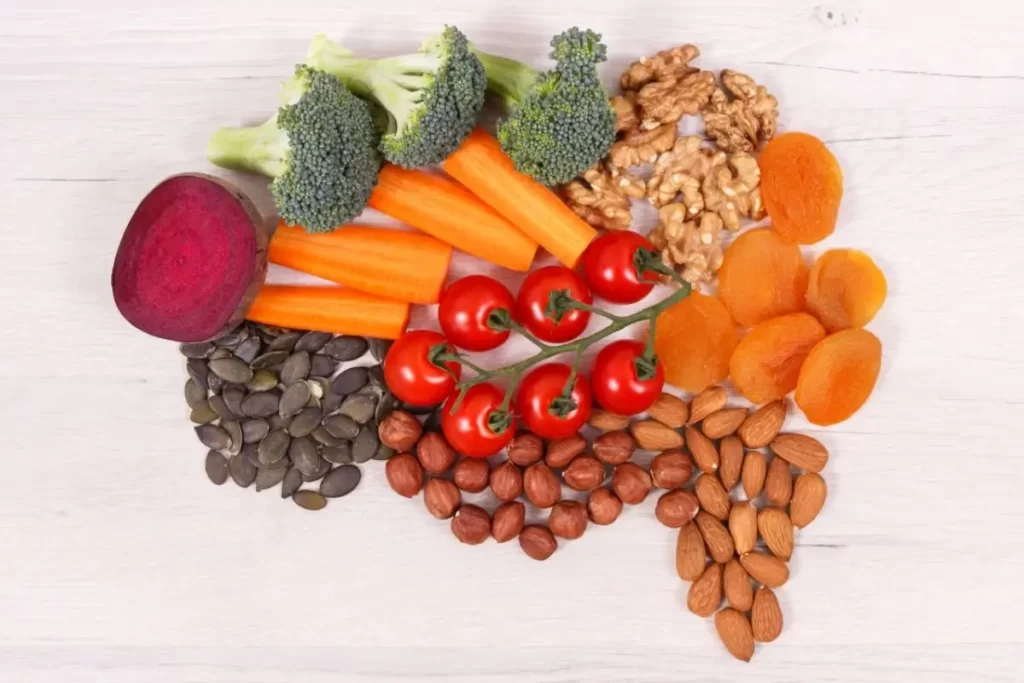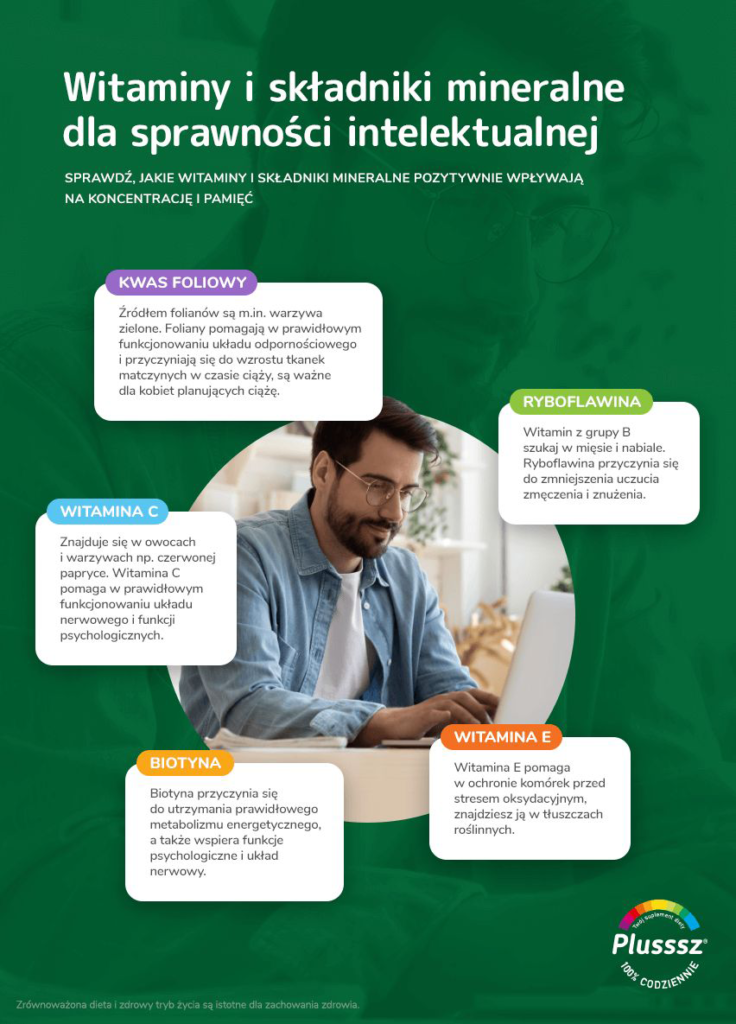The beginnings of formal education are very demanding, and it does not get easier with age. The number of responsibilities increases, and young people want to get involved in additional initiatives. The situation is not improved by the stress associated with upcoming exams and the need to periodically prepare extensive projects.
Meanwhile, effective mental work is not possible forever. A person, especially a young one, whose mechanisms for dealing with stress and mental fatigue have not yet been properly shaped, may have trouble concentrating for many hours. Controlling the feeling of fatigue and boredom during classes and during individual learning is very difficult for some people and you need to know how to concentrate.

Fig. 1. Studying for many hours can be tiring, and some students have trouble staying focused throughout the entire session.
The basis for dealing with this situation is developing a routine and good habits that help maintain mental hygiene and increase the efficiency and effectiveness of learning. Their additional effect is to improve mood and reduce stress, which affects not only academic results, but also social and community issues – so important for maintaining balance in young people. Below you will find information on mental work and learn in detail:
- What is mental work and why is it associated with such a large expenditure of energy?
- How to take care of good habits that will improve the efficiency and effectiveness of learning?
- How does diet affect the feeling of tiredness and fatigue during mental work?
- How to support students in everyday learning and how to help them achieve better results?
Characteristics of mental work of students
Depending on the level of education and its type, students sometimes spend even more hours studying than people working full-time professionally. Every day they have to be focused and attentive during classes at school or during lectures. Sometimes they end in the late afternoon hours, and when they get home, they are faced with… homework, projects, presentations, reports, readings and literature to read the next day, tests, entrance exams, preparation for regular tests and exams. It is not uncommon for a young person to finish studying late in the evening hours, in order to run to classes or straight to an exam in the morning.

Fig. 2. Studying often takes many hours.
Scientific organizations and organizations working for the scientific development of young people have been warning for years that young people and students are overloaded, and that studying in such conditions is very ineffective.
It should be understood that many issues, including those related to the organization of study, belong to the listeners, students and the environment in which they exist every day. The hours of classes and the number of homework, exams and projects at university, apart from exceptional situations, cannot be reduced. However, you can introduce habits and routines that will organize them. By taking care of a portion of exercise, a diet “for the brain” and space for rest and stress reduction, you can achieve great results in a short time.
Why do mental work and study consume so much energy?
The ease with which young people and adults learn may be an individual variable. Additionally, environmental factors, access to teaching aids or scientific methods used for students affect the results achieved.
The result of the teaching process and the fact whether a given type of scientific work is more or less tiring and requires increased energy are also influenced by the type of work performed. In the literature, authors distinguish many types of mental work, from the perspective of students, three are important:
- work performed without the need to operate additional devices, e.g. a computer;
- work performed with a computer, office or specialist equipment, e.g. during exercises and laboratories;
- creative work related to the need to produce new solutions or “works” understood as works of art, algorithms, presentations, texts, etc.
The types of mental work mentioned activate different parts of the brain, are associated with different levels of student engagement and are therefore a challenge at different levels of difficulty.

Fig. 3. Working with a computer can consume more energy than passively listening to a lecture.
What do students need for mental work and learning? Of course, their minds! One of the basic activities they must constantly perform during classes, laboratories, lectures or independent learning is thinking – a physiological function of the brain.
In order for the brain to work efficiently and be able to think, it is necessary to provide it with energy. Mental work is usually performed in a sitting position.
Currently, expert recommendations are changing and the issue of position is increasingly discussed as one of the factors that promote or inhibit the effectiveness of mental work, but these considerations and guidelines apply mainly to adults, who have greater flexibility and the ability to organize their own work than children and students.
In their case, school classes, university lectures and the vast majority of learning and mental work on assigned projects is done sitting down. When sitting, the energy expenditure that accompanies mental work is still greater than the level of basic energy metabolism.
What does this mean? That thinking consumes energy. The amount of energy used is strictly dependent on the emotional background, and so, for example, giving a lecture in front of an audience consumes about 30% more energy than reading a book. Reading texts considered “difficult” and conducting classes and high activity during them are also associated with high energy expenditure. What is the reason for this? Why is reading a book less energy-intensive than giving a lecture?
Because mental work is always accompanied by some muscle activity. Most researchers believe that the reason for the increased demand for energy is an increased heart rate, increased blood volume from the heart and increased blood pressure. Moreover, some types of mental work require the body to engage additional nervous activities, e.g. creative work on a project.
For this reason, it is very important to take care of the correct energy supply, not only for the sake of building muscles, bones and supporting the body in growth and development, but also because young people of school age and students spend energy for the purposes of mental work and continuous learning.
Diet for good results – what foods are good for concentration and memory?
Is there a “brain diet”? Yes. Does this mean that it is enough to enrich the current diet with a few products known for their beneficial properties for the brain? Absolutely not.
A diet that is good for mental activity, learning, reducing the feeling of tiredness and fatigue during learning should be comprehensive. In order for a student to have a chance to notice its beneficial effect on the results at university, some time must pass, and the changes introduced in nutrition should become natural and permanent. Meals should provide an appropriate amount of full-value protein, complex carbohydrates and healthy fats, in addition, vitamins are important, including: C, B vitamins, E, biotin and folic acid.

Fig. 4. Meals should provide an appropriate amount of high-quality protein, complex carbohydrates and healthy fats.
Below you will find the principles that are worth following when starting to compose meals for a young person who needs energy for mental work.
- Breakfast is the most important meal of the day – in the case of young people and students, this meal cannot be skipped. The high level of mental activity of young people requires fuel from the very morning. The first hours of studying “on an empty stomach” will be ineffective, and the student will be distracted by hunger.
For some young people and young adults, breakfast seems unimportant, they willingly skip it so that they can sleep a few minutes longer. This is incorrect behavior, which consequently leads to reduced efficiency during scientific work. If this condition lasts, it is increasingly difficult to take care of healthy habits, so as a parent, remind them about breakfast and make sure they eat it before going to classes or lectures. If you encounter resistance, start small – with a small portion of oatmeal, a fruit smoothie or attractively served sandwiches.
- Make sure meals are regular – young people and students are often away from home for many hours. Make sure they have a nutritious second breakfast, snacks and lunch with them if they cannot eat it in the school/university canteen. Meals should be easy to transport and store in a bag for a long time. Only those meal options that taste good when cold and can be easily eaten during a break will work.
Some students will be happy to eat sandwiches, fruit and homemade sugar-free granola bars, others will appreciate pasta with vegetables, smoothies or salad. The addition of nuts and green vegetables will provide young people with energy, vitamins and minerals that reduce the feeling of tiredness, fatigue and increase learning efficiency.
- It is difficult to think without water – regardless of age, we all tend to drink less than our body needs, and it is no different in the case of school youth and students. Remembering to regularly replenish fluids is difficult, but proper hydration of the body is essential for thought processes to run smoothly. Young people also have a lot of movement during the day – classes at the university, lectures and additional activities are interspersed in their schedule with social meetings and sports activities, during which they lose hydration.
Make sure that the young scientist has a bottle of water with them. A bottle is usually not the most handy and it is an additional burden in the bag, instead of traditional water in bottles you can suggest that the child/student carries a reusable bottle with them, which filters tap water, so that it can be filled on the way or at the university, without having to carry a full one with them for most of the day.
A filtering bottle and an interesting lunch box can be a great gift for a student who is flying away from the family nest. Thanks to such a gift, it will be easier for them to take care of regular meals and hydration of the body. You can also give them a book with simple recipes for brain-healthy dishes or consider using easy and convenient vitamin preparations.
- Superfood as an addition to meals. Some food products are called superfoods, what does it mean? Usually, it is that a given product contains a particularly high amount of vitamins, minerals or other substances (e.g. polyphenols, antioxidants, etc.) that have a positive effect on well-being in a specific area.
Among the products that are often mentioned as good for the brain are: nuts, seeds, sea fish, raspberries, vegetable fats, green vegetables – e.g. spinach, kale and parsley. The above products contain, among others, magnesium, which helps in the proper functioning of the nervous system, and vitamin C, which also supports the nervous system and psychological functions.
The listed foods contain a number of beneficial vitamins and minerals that help keep the student in good mental condition, including magnesium and omega acids. This does not mean that the listed products should be the only ingredients of the meals prepared. They should be a supplement to the healthy eating pyramid. Remember that its basis is exercise and hydration.
- The last one should be eaten 2 hours before going to bed. Ensuring this time allows you to ensure healthy sleep for your student and consequently make it easier to get up in the morning. If the last meal is eaten very late, just before going to bed, it can make it difficult to fall asleep or cause unpleasant symptoms from the abdomen, which translate into poorer quality sleep. A proper night break is important for regeneration, but also for whetting the appetite before breakfast and the next, challenging day.
Slowly but consistently implementing small changes in meal planning after a few weeks can pay off in better academic results and easier focus when deepening knowledge.
When composing a student’s diet, make sure it is rich in nutrients and vitamins and minerals that have a positive effect on reducing the feeling of fatigue and weariness during intense mental effort. Which vitamins are particularly important for students working intellectually? You will learn more in the rest of the article.

Fig. 5. Vitamins and minerals are important for maintaining well-being and concentration.
Vitamins and minerals as support for memory and concentration
A proper diet is the absolute foundation of well-being. Ensuring the correct level of vitamins and minerals in the diet of active people, including mentally active children and students, has the potential to pay off with better well-being, reduced feelings of tiredness and fatigue, and easier concentration. Where to look for vitamins and additional ingredients that have the potential to positively affect better mental work results and well-being?
First of all, ensure an adequate supply of vitamin C. Vitamin C is available in many fruits and vegetables. Interestingly, its source can also be unusual food ingredients – green nuts or pine needles. Of course, they are not a standard food additive, so when planning meals for the intense mental work of a young student or pupil, try to include vegetables and fruits containing a high dose of vitamin C. Below in the table you will find sample products:
| Product | Vitamin C content in mg/100g |
| Blackcurrant fruit | 182 |
| Pepper | 139 |
| Brussels sprouts | 94 |
| Spinach | 67 |
| Cauliflower | 70 |
The content of vitamin C in fruits and vegetables varies and may depend, for example, on the way vegetables are stored and their quality, so the above values should be treated as approximate.
In addition to vitamin C, vitamin E is important in the diet for the brain. Vitamin E helps cells cope with oxidative stress. The natural source of this vitamin are vegetable fats and products that contain them. Where exactly can you find it? The table provides examples of products rich in vitamin E.
| Product | Vitamin E content in mg/100g |
| Vegetable oils | to 149 |
| Almonds | 24 |
| Pumpkin seeds | 26 |
| Sunflower seeds | 28 |
| Hazelnuts | 38 |
Vitamin E dissolves in fats, its presence in vegetables and fruits is relatively small. For example, 100 grams of spinach contain only 2 mg of vitamin E.

Fig. 6. Olive oil and other vegetable fats are a good source of vitamin E.
In addition to vitamins C and E, an important group of vitamins from the perspective of mental performance are the B vitamins. They are found in cereals, unprocessed flour products, seeds and legumes. You can get vitamin B by supplementing your diet with dairy products, eggs and high-quality lean meat.

Questions and answers about nutritional support for mentally active people
Many people who work mentally and have students or other people strongly focused on gaining new knowledge among their loved ones ask themselves how to increase efficiency in a wise, balanced way, shorten learning time, overcome the feeling of fatigue and boredom with the acquired material and how to maintain focus for as long as possible.
Is drinking coffee and energy drinks a good way to increase concentration and focus for a long time?
No, this method, popular especially among students and people who work a lot, is deceptive and used for several months can contribute to a deterioration in well-being and reduced efficiency. Energy drinks, in addition to stimulants, contain sugar, which, consumed in excess, can cause obesity and the development of chronic problems. Coffee and strong tea can contribute to the flushing of minerals from the body and the discomfort associated with it. Additionally, their effect is short-lived.
It is important to act long-term. A healthy lifestyle, diet and ensuring an adequate supply of vitamins will certainly work better and for longer. If you are looking for stimulants, consider herbal remedies, such as those containing caffeine, guarana and yerba mate extract.
What can replace chocolate and sweet snacks that are conveniently eaten during mental work?
When you are working mentally after hours or preparing for exams, the temptation to reach for sweet, chocolatey snacks can be hard to resist. A few cubes of dark chocolate or a handful of nuts do seem like a good, healthy option. Cocoa and nuts contain large amounts of magnesium and vitamin E (nuts), which helps cells cope with everyday oxidative stress. However, if you find it hard to resist and rarely finish with a few cubes, choose pumpkin seeds or vegetables cut into sticks instead of dark chocolate.
A convenient, sweet alternative can be a portion of vitamins dissolved in cold water. Vitamins in this form are easy to take, and at the same time the drink has a fruity taste – it will satisfy your craving for sweets and provide stimulants, vitamins and minerals.
How to deal with the overwhelming feeling of fatigue when work seems endless?
A drop in mood and a feeling of fatigue can appear after many hours of mental work or studying. Sometimes they are an additional source of stress – an exam, a project deadline, a test is approaching, and motivation and concentration are nowhere to be found. In such cases, it is good to break away from the task at hand for a few minutes. Breathing exercises, a brisk walk or a few physical exercises promote concentration and help maintain focus for longer.
If it is not possible to stop working for that long, it is worth considering a healthy meal and replenishing fluids. Give up coffee and energy drinks, a better solution will be fruit juice, a light herbal infusion or a vitamin preparation, which will not only replenish fluids and vitamins, but will also provide you with mildly acting plant extracts, which will have a positive effect on your arousal and help you cope with fatigue.
Fatigue, fatigue from studying – how to find motivation?
Many hours of “cramming” and mental work on one project can have a negative impact on motivation and as a result, affect the result of a test, exam or completing the project on time. If you observe such a state in your loved one or yourself, it is important to react in time.
Divide large goals into smaller, measurable and easy to achieve. In small steps, it is easier to overcome the difficulty and achieve the goal to which so much attention and work has been devoted.
During mental work, energy demand is greater, so do not forget about proper nutrition during this time and providing the student or worker with the appropriate dose of vitamins and minerals.
Take care of the hygiene of your intellectual work
Remember that common sense and balance should be maintained in all activities. Forcing a young scientist to study for many hours or overloading their schedule with extracurricular and sports activities does not promote efficiency. Similarly, in the case of students – limiting social activities will not improve academic results, and a young intellectual worker will find within themselves extraordinary reserves of motivation, focus and concentration.

Fig. 7. Rest and mental hygiene are just as important as time spent studying and working.
If you have someone in your environment who is exceptionally mentally active, or you yourself are looking for solutions to help overcome fatigue and support concentration, start with the basics. Ensuring a properly balanced diet, an adequate supply of vitamins, exercise and time to rest will certainly pay off with great results.
Bibliography:
- Karmańska A., Stańczak A., Karwowski B., Magnesium – current state of knowledge, “Bromatology and Toxicological Chemistry” 2015, no. 48, vol. 4, pp. 677–689.
- Kiełbasa P., Juliszewski T., Kądzioła D., The influence of the type of mental activity related to the work of an IT specialist on mental fatigue and the degree of physiological workload, “TTS Technika Transportu Szynowego” 2015, no. 12, vol. 22, pp. 772-778.
- Witczak W., The ability to do hard mental work, “Teka Komisji Prawniczej PAN Oddział w Lublinie” 2008, pp. 208–216.
- Janda K., Kasprzak M., Wolska J., Vitamin C – structure, properties, functions and occurrence, “Pomeranian Journal of Life Sciences” 2015, no. 61, vol. 4, pp. 419–425.
- Konopacka M., The role of vitamin C in oxidative DNA damage, “Postępy Higieny i Medycyny Doświadczalnej” 2004, no. 58, pp. 343–348.
A balanced diet and a healthy lifestyle are important for maintaining health.
